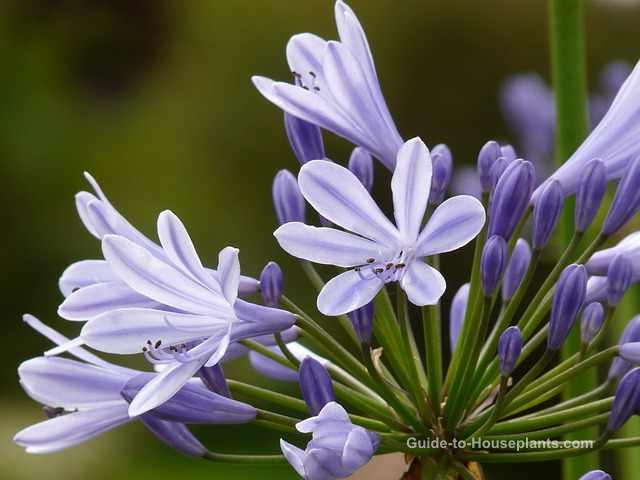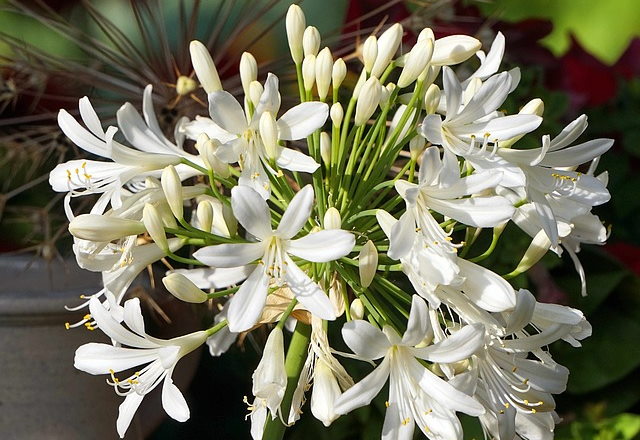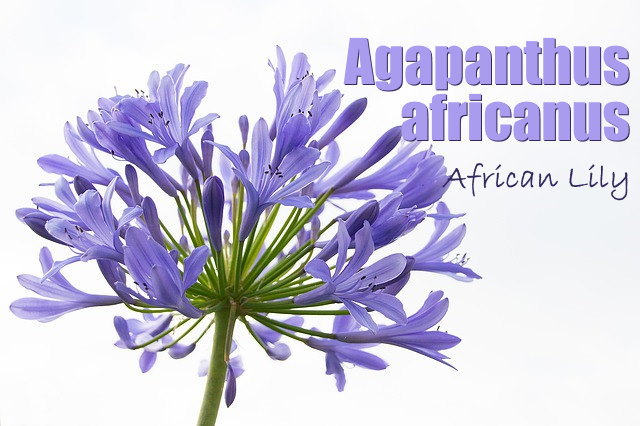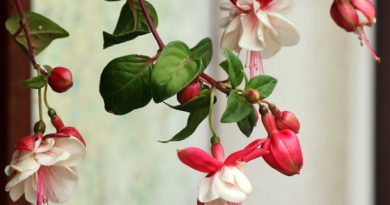African Lily aka Lily of the Nile
Botanical Name: Agapanthus africanus
Showy blue flower clusters topping the tall stems of African lily have captured gardeners’ hearts for years. But did you know that you can grow this dazzling beauty indoors? African lilies grow wonderfully in containers.
 Agapanthus gets its name from the Greek words agape meaning love and anthos meaning flower.
Agapanthus gets its name from the Greek words agape meaning love and anthos meaning flower.Give your plant plenty of light. Some full sun is needed to make this beauty bloom. And when it does — several flower stems will burst with clouds of blue-hued blossoms all summer. This garden favorite makes an ideal potted plant for the sunroom or any room that gets full sunlight. Turn the pot each week to give each side even light exposure.
Caring for African Lilies Year-Round
Pot ’em up. Each plant sends up several leafless flower stems, surrounded by a fountain of long, sword-shaped leaves and needs room to grow. Plant rhizomes 1-inch (2.5 cm) deep. It’s best to plant one per pot because plants eventually spread out at least 1 ft (30 cm) wide.
Repot in spring only when necessary. This flowering plant blooms best when pot-bound, so keep the fleshy rhizome roots crowded in the container. Use a pot with drainage holes to prevent soggy soil.
Overwinter A. africanus in a sunny window. Cut back on watering, but don’t allow the soil to dry out. Stop fertilizing after flowering is over. In early spring, resume normal care.
If you’ve never grown African lilies, give them a try. Growing these tender perennials indoors is easy and, with good care, you’ll enjoy their gorgeous flowers year after year.
 Pure white flowers make Agapanthus africanus ‘Albus’ well-worth seeking. Photo: Matthias Böckel
Pure white flowers make Agapanthus africanus ‘Albus’ well-worth seeking. Photo: Matthias BöckelAfrican Lily Buying Tips
You’ll find Agapanthus africanus for sale in spring and summer in garden centers and nearly year-round at some online nurseries.
Though most are blue, one cultivar ‘Albus’ is pure white. A dwarf variety exists — ‘Peter Pan’ only reaches about 10 inches (25 cm) tall.

African Lily Care Tips
Origin: South Africa
Height: 2-3 ft (60-90 cm)
Light: African lilies thrive in full sunlight. If you don’t get many blooms, move your plant to a sunnier location. Moving African lily outdoors for the summer will give it the sunlight it needs.
Water: Water generously throughout the growing season, keeping the soil evenly moist. Water sparingly after flowering is finished. It’s a good idea to use a pot with drainage holes because African Lily won’t tolerate soggy soil. Yellow leaves are usually a sign of overwatering.
Humidity: Try to maintain 40-50% relative humidity. Use a cool-mist room humidifier for best results.
Temperature: Average room temperatures 65-80°F/18-27°C. If you scoot your container to the patio or porch for the summer, don’t worry — it can take the heat. But bring it back indoors when the temperature drops…these tender perennials will only tolerate temps as low as 50°F/10°C.
Soil: Good-quality, all-purpose potting mix
Fertilizer: Feed monthly in spring and summer with a high-phosphorous water-soluble fertilizer.
Propagation: Divide plants in spring every 4 years or when they get too crowded. Sow African lily seeds in spring. Plants grown from seed may take 2 to 3 years to flower.




